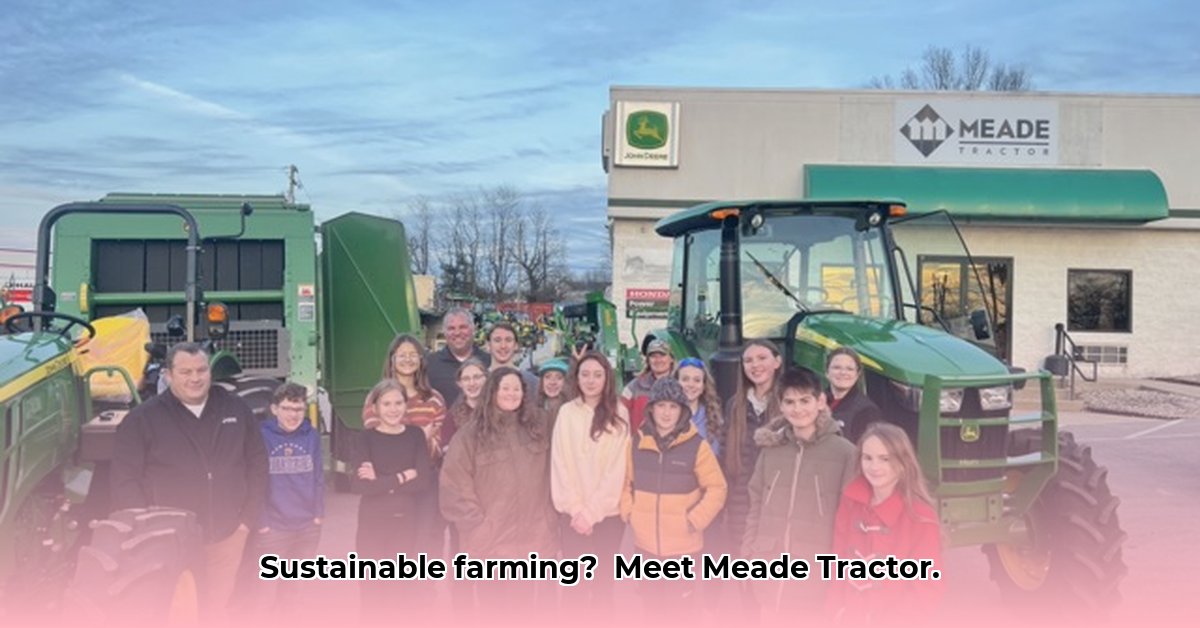
Meade Tractor, located in Christiansburg, Virginia, is more than just a supplier of agricultural equipment; it's a driving force behind sustainable farming practices in the region. By offering innovative technology, fostering community partnerships, and providing crucial educational resources, Meade Tractor empowers local farmers to cultivate both thriving crops and a healthy environment. This article delves into their multifaceted approach to sustainable agriculture, highlighting the tangible benefits for farmers and the positive impact on the wider community. For more Virginia tractor options, check out this other location.
Meade Tractor's Commitment to Sustainable Agriculture
Meade Tractor's dedication to sustainability isn't a marketing ploy; it's woven into the fabric of their operations. They understand that a healthy environment is inextricably linked to profitable farming. This commitment manifests in several key ways:
Optimizing Resource Use: Fuel Efficiency and Precision Technology
Farming is an energy-intensive endeavor, and fuel costs significantly impact a farmer's bottom line. Meade Tractor addresses this challenge by offering a range of fuel-efficient tractors and machinery. This contributes not only to reduced operating expenses but also to a smaller environmental footprint—a win-win situation. But fuel efficiency is just one piece of the puzzle. Meade Tractor also champions precision agriculture, providing farmers with access to GPS-guided equipment for planting, fertilizing, and spraying. This technology allows for targeted resource application, minimizing waste and maximizing yields. Isn't it remarkable how technology can marry environmental responsibility with increased profitability?
Fostering Collaboration: Partnerships and Community Engagement
Meade Tractor recognizes the power of collaboration. They actively partner with local agricultural organizations and environmental groups, forging a strong network of support and shared knowledge. This collaborative spirit extends to farmers themselves, creating a supportive community where best practices and lessons learned are freely exchanged. This network effect amplifies the impact of individual efforts, accelerating the adoption of sustainable farming techniques across the region. How can we better replicate this model of collaborative sustainability?
Empowering Farmers: Training and Educational Initiatives
Meade Tractor’s commitment goes beyond providing equipment; they invest heavily in farmer education. They host regular workshops and training sessions, equipping farmers with the knowledge and skills needed to successfully implement sustainable practices. These sessions cover a wide range of topics, from soil health management to the effective use of precision agriculture technologies. This empowers farmers to make informed decisions, leading to greater efficiency and profitability while minimizing their environmental impact. What innovative education programs could further enhance farmer adoption of sustainable practices?
Real-World Impact: Farmer Success Stories
The success of Meade Tractor's approach is evident in the stories of local farmers. Sarah Miller, for instance, implemented precision planting techniques using equipment from Meade Tractor, achieving a remarkable 15% reduction in fertilizer use without any decrease in crop yield. This demonstrates the tangible benefits of sustainable farming practices—higher profits and a healthier environment. These real-world successes are powerful testimonials to the effectiveness of Meade Tractor's efforts. How can we showcase more farmer success stories to inspire wider adoption of sustainable farming?
Challenges and Opportunities for Sustainable Agriculture in Christiansburg
While progress is being made, challenges remain. The initial investment in sustainable technologies can be a barrier for some farmers. Furthermore, the specific soil conditions and climate of the Christiansburg region require tailored approaches to sustainable farming. Meade Tractor is actively addressing these challenges by working closely with local universities and research institutions to develop and test region-specific sustainable solutions. They also actively work with government agencies to secure funding and support for farmers adopting sustainable practices. What government policies and funding programs could be implemented to better support the transition to sustainable agriculture?
Conclusion: Cultivating a Sustainable Future
Meade Tractor plays a pivotal role in shaping the future of agriculture in Christiansburg, Virginia. Their comprehensive approach—combining technological innovation, community engagement, and educational outreach—is creating a ripple effect, empowering farmers to adopt sustainable practices that benefit both their businesses and the environment. Their commitment serves as a model for other agricultural businesses and highlights the potential for synergy between economic prosperity and environmental stewardship. How can we encourage more agricultural businesses to adopt similar sustainability initiatives?